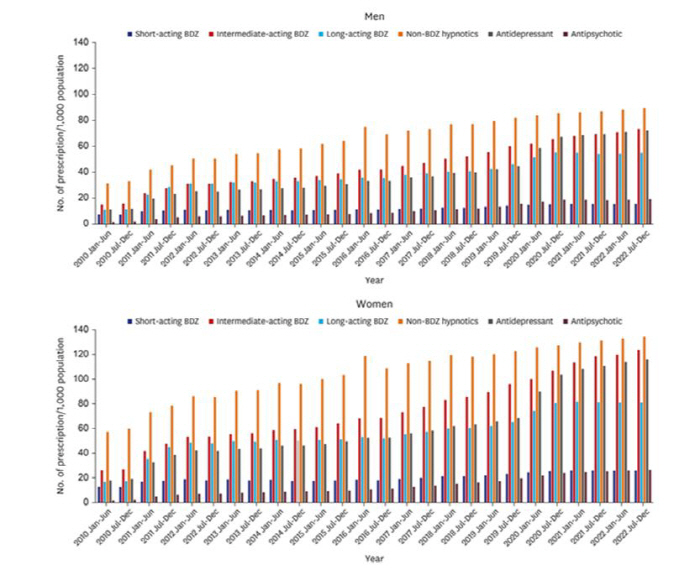COVID pandemic, use of sleeping pills for insomniac patients in Korea increases
Aug 29, 2025
|
Insomnia is a common symptom that 3 to 5 out of 10 people suffer at any point in their lives. In particular, insomnia, a typical sleep disorder that is difficult to fall asleep, often wakes up, or wakes up early in the morning, can lead to mental health problems such as depression and anxiety, as well as worsening physical diseases and poor quality of life. While there have been studies abroad showing an increase in the use of sleeping pills during the pandemic, this is the first large-scale analysis in Korea comparing forecasts with actual prescriptions based on pre-pandemic prescription trends.
A joint research team led by Professor Lee Yoo-jin of the Department of Mental Health Medicine at Seoul National University Hospital and Professor Shin Ae-sun of the Seoul National University School of Preventive Medicine (co-author: Professor Shin Ji-yoon of Seoul Boramae Hospital, researcher Jeon So-yeon of Seoul National University) announced on the 29th the study of 8,136,437 insomnia patients (60.4%) aged 18 or older in Korea from 2010 to 2022 using national health insurance data.
|
As a result of the analysis, the amount of sleeping pills prescribed and the number of prescribed patients steadily increased in all drug lineages from 2010 to 2022. The total number of prescriptions has more than quadrupled over a 12-year period from about 10.5 million in 2010 to about 38.5 million in 2020, about 41.2 million in 2021 and about 42.4 million in 2022. In particular, women consistently showed higher prescriptions than men despite the large total number of patients, and the elderly over 70 maintained a higher level than other age groups.
Comparisons with pre-pandemic predictive models show that the actual amount of sleeping pills prescribed exceeded predictions in all age groups during COVID. Among them, young adults between the ages of 18 and 29 exceeded predictions the most in all drug systems in 2021, indicating that the pandemic's impact on the use of sleeping pills by young people was particularly noticeable.
Meanwhile, from 2010 to 2022, the most prescribed sleeping pills in Korea were zolpidem, followed by alprazolam and trajodone. Among the drug systems, non-benzodiazepines such as zolpidem were most prescribed, followed by mid-half-life benzodiazepines, low-dose antidepressants, and long half-life benzodiazepines. In particular, combination prescriptions using intermediate half-life benzodiazepines and non-benzodiazepines such as zolpidem were also common.
Changes in actual prescriptions were also noticeable. Compared to 2019, low-dose antidepressants used for sleeping pills increased 38.6% (about 1.51 million) for men and 37.1% (about 2.31 million) for women in the first half of 2020, while low-dose antipsychotics also increased 28.9% (about 450,000) for men and 25.7% (about 560,000) for women during the same period, recording the second-largest increase. These drugs maintained higher prescription doses in 2021 compared to 2019.
On the other hand, non-benzodiazepine sleeping drugs such as zolpidem had the smallest increase, so the difference from the predicted value was relatively small.
Professor Lee Yoo-jin of Seoul National University Hospital (Department of Mental Health Medicine) "From 2010 to 2022, the amount of sleeping pills prescribed steadily increased, especially among women and the elderly."During the pandemic, prescriptions of low-dose antidepressants and antipsychotic drugs used for sleeping pills significantly exceeded predictions, and the increase was particularly noticeable among young people aged 18 to 29, so safe use of drugs and monitoring of side effects around those classes are more important."
The results of this study were published in the online edition of the Korean Medical Association's international journal 'JKMS (Journal of Korean Medical Science).'
|
This article was translated by Naver AI translator.
















